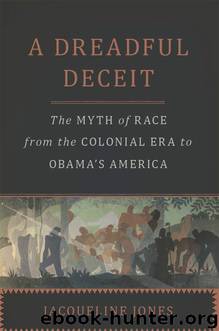A Dreadful Deceit by Jacqueline Jones

Author:Jacqueline Jones [Jones, Jacqueline]
Language: eng
Format: epub, mobi
ISBN: 9780465069804
Publisher: Basic Books
Published: 0101-01-01T00:00:00+00:00
As whites shifted their depictions of blacks in the wake of Reconstruction, so, too, did black leaders remake their own political message. Vardaman’s virulent antiblack rhetoric played well among poor white voters, whom he called the “good old-fashioned people—the hale, hard-working people.” He precisely calculated this appeal to woo constituents who were not sharing in the putative New South prosperity enjoyed by textile mill owners, railroad operators, merchants, and lumbermen. Washington’s appeal to his own supporters was calculated as well. This group included northern whites; a slice of the black middle class, North and South; and what he called the “better” white men of the South. Washington stressed the redemptive power of schooling to lead rural folk to fuller, more productive lives through a series of incremental steps designed to inculcate in pupils specific farm-management and artisanal skills.18
In fact, southern whites disagreed among themselves about the value of black schooling in its many forms, whether literacy instruction at the elementary level, “vocational” training in wheel-making and blacksmithing, the preparation of common-school teachers, or classical higher education. Vardaman condemned black instruction of any kind and argued that the money paid by black taxpayers into the state’s educational fund could be better used staffing white schools. In contrast, some planters, such as Alfred Holt Stone, held that modest rural schools could keep sharecroppers rooted to one place and thus discourage annual turnover. Stone worried that if state authorities did not provide money for black schools, meddling Northerners would. Other whites promoted black “industrial” schools that trained cooks, laundresses, carpenters, and tinsmiths. Significantly, few argued that blacks had no ability or willingness to learn—just the opposite. One anxious southern politician noted that “it had come to his knowledge that Negroes would give the clothing off their backs to send their children to school, while too often the white man, secure in his supremacy, would be indifferent to his duty”—that is, to educate his own children. And indeed statistics confirmed rapidly declining illiteracy rates among the southern black population, from 44 percent in 1900 to 30 percent ten years later.19
Beginning in the 1890s, debates over the nature and capabilities of the “darker” or “subject” races took place in the halls of Congress, the classrooms of universities, and the pages of popular magazines and southern agricultural journals. These arguments encompassed peoples of all colors and ethnicities, not just those considered black. Controversies surrounding public education reflected larger domestic concerns about the fate of Native Americans, a so-called dying race, and recently arrived Eastern European immigrants and about the related dilemma of integrating Hawaiians, Cubans, Puerto Ricans, and Filipinos into an emerging American empire.20
As colonial powers sought out the raw materials that would fuel emerging industrial economies, the plight of rural southern blacks bore marked similarities to that of other oppressed laborers around the world. Millions of American field workers were part of a global labor force in agriculture, mining, and lumbering. Whether in the Belgian Congo, British Soudan, Nigeria, Rhodesia, Puerto Rico, Chile, India, Malaya,
Download
This site does not store any files on its server. We only index and link to content provided by other sites. Please contact the content providers to delete copyright contents if any and email us, we'll remove relevant links or contents immediately.
| African-American Studies | Asian American Studies |
| Disabled | Ethnic Studies |
| Hispanic American Studies | LGBT |
| Minority Studies | Native American Studies |
Cecilia; Or, Memoirs of an Heiress — Volume 1 by Fanny Burney(32558)
The Great Music City by Andrea Baker(32018)
Cecilia; Or, Memoirs of an Heiress — Volume 2 by Fanny Burney(31956)
Cecilia; Or, Memoirs of an Heiress — Volume 3 by Fanny Burney(31941)
We're Going to Need More Wine by Gabrielle Union(19046)
All the Missing Girls by Megan Miranda(16023)
Pimp by Iceberg Slim(14506)
For the Love of Europe by Rick Steves(14121)
Bombshells: Glamour Girls of a Lifetime by Sullivan Steve(14073)
Talking to Strangers by Malcolm Gladwell(13370)
Norse Mythology by Gaiman Neil(13363)
Fifty Shades Freed by E L James(13239)
Mindhunter: Inside the FBI's Elite Serial Crime Unit by John E. Douglas & Mark Olshaker(9339)
Crazy Rich Asians by Kevin Kwan(9290)
The Lost Art of Listening by Michael P. Nichols(7506)
Enlightenment Now: The Case for Reason, Science, Humanism, and Progress by Steven Pinker(7311)
The Four Agreements by Don Miguel Ruiz(6763)
Bad Blood by John Carreyrou(6621)
Weapons of Math Destruction by Cathy O'Neil(6279)
